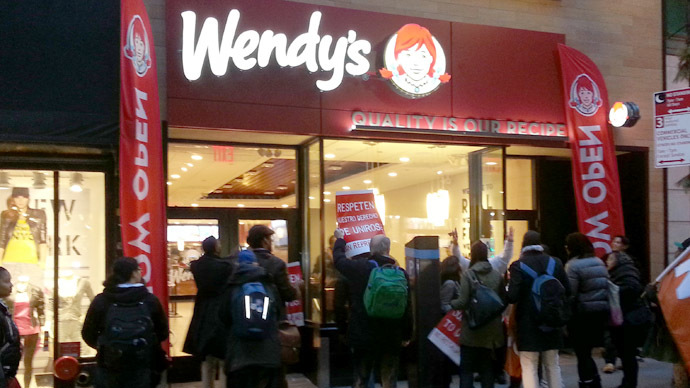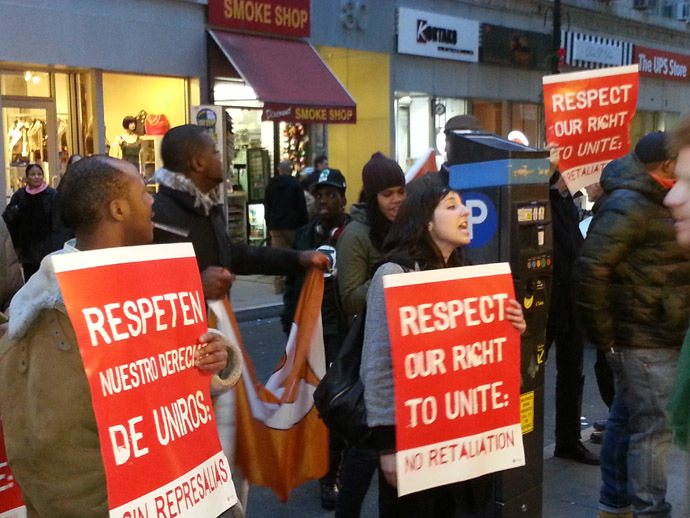America fighting for justice, 1 burger at a time

The fight to organize fast food workers, improve working conditions, and raise the minimum wage has evolved from a few isolated protests to a bona fide movement in cities across the United States.
Walking to the subway after a long day of work I, like most New Yorkers, was busy putting in my headphones to drown out the cacophony of noise from construction equipment, buses whizzing by on Broadway, and the grinding sound of trains lumbering down their metal tracks beneath my feet. This daily ritual, like washing my hands or brushing my teeth, is simply a part of everyday life in the city.
However, on this day, something new caught my attention – a booming chorus of voices chanting in unison, cutting through all the other noise of the city. As I turned a corner, I saw the source of all the noise – a picket line set up in front of a Wendy’s fast food restaurant location. The protesters, most of whom were young and immigrant workers and activists, were standing in front of Wendy’s demanding a living wage and improved working conditions and, perhaps above all, the right to unionize.
The protest was small in scale, comprising maybe 25-30 people in all. However, the action cannot be seen in isolation. Rather, it is merely one small manifestation, on a Monday afternoon, of a much larger movement developing in this city – a movement demanding dignity for some of the most underpaid and exploited workers in the country.
Such protests, many of which have been decidedly larger in terms of participants, have become almost commonplace in New York, as they have in other major cities. This ‘normalizing’ of fast food worker protest is an essential part of raising awareness of not only the plight of fast food workers, but of all underpaid and exploited labor. Once seen as an oddity, it is no longer shocking to see - as I did yesterday - a fast food location completely empty as protesters shame it from outside.

The action was sponsored by New York Communities for Change (NYCC), an organization that describes itself as “a coalition of working families in low and moderate income communities fighting for social and economic justice throughout New York State. [NYCC uses] direct action, legislative advocacy, and community organizing…to impact the political and economic policies that directly affect us.”
This sort of grassroots organizing does not necessarily have a national impact immediately, no matter how many chapters might be established, no matter how many protests might be planned. They cannot possibly overcome the inertia of a multi-billion-dollar corporate model overnight. However, that is not the goal. Instead, NYCC, like many similar organizations, attempts to affect the local conditions so that the lives of working people and their families are improved and, through such localized struggle, enable many communities from all over the country to unite their struggles into a national movement.
It may seem obvious that one would want to localize these issues, but in many ways this runs counter to the traditional political logic of the United States which holds that organizations, NGOs, and other similar institutions must raise large sums of money from corporate donors and ‘philanthropists’ in order to make a dent in the national political landscape. Instead, the movement for fast food workers’ rights is emerging due to authentic ‘people power’. This must be seen as a truly positive development.
Socialism: No longer a dirty word
The struggle for low-wage workers’ rights is not confined to fast food workers, nor is it confined to New York City. Instead, this movement is beginning to take on a national character, despite being mostly ignored by the corporate media.
There is no better example of the ‘mainstreaming’ of this movement than the election of socialist Kshama Sawant to Seattle City Council. During her campaign which centered on workers’ rights, and specifically the raising of the minimum wage to $15 per hour, the city elite, including the major media outlets and political organizations, largely discounted her chances. Seeing her as merely a ‘third party candidate’ which, in the parlance of contemporary US politics, is equivalent to calling her campaign irrelevant, the Democratic Party establishment expected to steamroll her on their way to yet another victory. However, her improbable triumph over the moneyed interests backing the Democratic Party candidate dealt a major blow to the ego and power of the political machine.

Sawant won her seat on the Seattle City Council for one main reason: her program spoke to the people. Advocating a true living wage, renters’ rights, and standing up to Boeing among other things, made Sawant a true ‘people’s candidate’. Rather than retreading the same tired platitudes of every election cycle, Sawant spoke directly to, and for, the people. In this way, her victory not only establishes a model for others to follow, it flies in the face of conventional wisdom which holds that no third party candidate, let alone Socialist, can win.
Some might say, “So what if a Socialist won? This changes nothing.” While such cynicism is an understandable by-product of generations living under a controlled political system beholden to finance capital, this sort of thinking must be overcome if there is going to be substantive change in the US. If Sawant’s victory teaches us anything, it is that the ever-worsening economic conditions of working people in the US must be addressed by candidates and organizations alike. More and more, working people are looking for leaders who speak to their needs rather than their ‘values’. Slowly but surely, the so-called Great Recession is opening up a space for alternative ideas and ideologies within the political sphere. This is, of course, dangerous for the political establishment.
As I walked away from the small protest outside that Wendy’s just blocks from Wall Street, the seat of global finance capital, I couldn’t help but smile. Of course, I was happy to see working people, especially young and immigrant workers, demanding fair treatment and decent working conditions. Naturally, I was pleased to have stumbled upon this action. But to be honest, the main reason that I was smiling was very simple: this was just another ordinary Monday afternoon.
The statements, views and opinions expressed in this column are solely those of the author and do not necessarily represent those of RT.
The statements, views and opinions expressed in this column are solely those of the author and do not necessarily represent those of RT.













